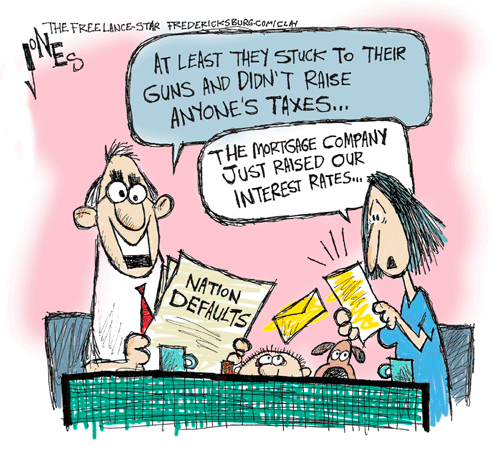“Punting the Pundits” is an Open Thread. It is a selection of editorials and opinions from around the news medium and the internet blogs. The intent is to provide a forum for your reactions and opinions, not just to the opinions presented, but to what ever you find important.
Thanks to ek hornbeck, click on the link and you can access all the past “Punting the Pundits”.
Paul Krugman: The President Surrenders

A deal to raise the federal debt ceiling is in the works. If it goes through, many commentators will declare that disaster was avoided. But they will be wrong.
For the deal itself, given the available information, is a disaster, and not just for President Obama and his party. It will damage an already depressed economy; it will probably make America’s long-run deficit problem worse, not better; and most important, by demonstrating that raw extortion works and carries no political cost, it will take America a long way down the road to banana-republic status.
New York Times Editorial: To Escape Chaos, a Terrible Deal
There is little to like about the tentative agreement between Congressional leaders and the White House except that it happened at all. The deal would avert a catastrophic government default, immediately and probably through the end of 2012. The rest of it is a nearly complete capitulation to the hostage-taking demands of Republican extremists. It will hurt programs for the middle class and poor, and hinder an economic recovery.
It is not yet set in stone, and there may still be time to make it better. But in the end, most Democrats will have no choice but to swallow their fury, accept the deal and, we hope, fight harder the next time.
OUR nation isn’t facing just a debt crisis; it’s facing a democracy crisis. For weeks, the federal government has been hurtling toward two unsavory options: a crippling default brought on by Congressional gridlock, or – as key Democrats have advocated – a unilateral increase in the debt ceiling by an unchecked president. Even if the last-minute deal announced on Sunday night holds together, it’s become clear that the balance at the heart of the Constitution is under threat.
The debate has threatened to play out as a destructive but all too familiar two-step, revealing how dysfunctional the relationship between Congress and the president has become.
Katrina vanden Heuvel: From the debt debate to a hostage revolt
In the melodrama that is consuming Washington this hot summer, featuring the spectacle of how much Tea Party Republicans will be able to extort for agreeing not to blow up the economy, the values and priorities of most Americans were early casualties. That reality will drive – no matter what the resolution this week – new, independent citizen mobilizations challenging both Republican zealotry and Democratic cravenness.
The debt-ceiling debate has lasted long enough for most Americans to start paying attention and to realize just how divorced both parties are from basic common sense. With the economy faltering and 25 million people in need of full-time work, most Americans want Washington focused on how to create jobs and get the economy going, not on slashing spending for the rising number of poor children while sheltering tax havens for millionaires.
John Nichols: GOP’s Debt-Ceiling Games Have Raised the Prospect of a “Crunching Global Recession”
U.S. markets trended downward all last week, as congressional Republicans refused to get serious about raising the debt ceiling.
Now, international markets are jittery. And as the August 2 deadline for resolving the issue looms, there is growing concern about a radical response to the political meltdown that occurred when House Speaker John Boehner, R-Ohio, and the House Republican Caucus decided Friday to abandon realistic negotiations to resolve the debt-ceiling standoff.
There is suddenly talk, serious talk, that the faked up crisis created by Republicans who are refusing to allow a Democratic president to do what Ronald Reagan and George Bush did repeatedly — borrow the money needed to pay for spending approved by Congress — could cause a “crunching global recession.”
Robert Freeman: We Must Destroy the Government in Order to Save It
A certain, macabre phrase came to personify the Vietnam War: “We had to destroy the village in order to save it.” The colonel who uttered it was doubtless oblivious to both the psychotic irony and the larger surreal symbolism that the phrase represented. Savage destruction was perfectly consonant with ideologically-intended salvation, just so long as both were issued by the same sanctimonious American official. Indeed, in some perverse medieval rendering of modern imperial justice, salvation could only be achieved through destruction.
The phrase might just as well be a rallying cry for the Tea Party Republicans and their holy jihad against government and the cooperative society that government represents: they must destroy it in order to save it. For that is unquestionably what the debt ceiling debacle is really about.
Let’s dispense once and for all with the fiction that the debt ceiling debate is anything but a contrivance to destroy government and the shared aspirations to civility that government represents.

Recent Comments